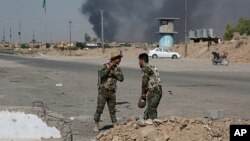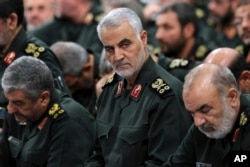U.S. officials are increasingly worried tensions between Iraq's government and Iraqi Kurdish officials are playing right into the hands of the two forces Washington most wants to contain in the region: the Islamic State terror group and Iran.
So far, Kurdish Peshmerga forces seem to have been willing to cede ground, leaving bases and checkpoints as Iraqi forces move swiftly to reclaim parts of the Kurdish autonomous region in northern Iraq.
Officials in Washington repeatedly have sounded the alarm, however, over concerns about what further escalation might bring.
"The biggest winners from further tensions would be ISIS and the IRGC — an outcome we should all want to avoid," a National Security Council spokesperson said, using acronyms for Islamic State and Iran's Revolutionary Guard Corps, respectively.
"The U.S., the government of Iraq, the Kurdistan Regional Government, and our entire coalition must be united in prioritizing the final defeat of ISIS," the official added.
U.S. intelligence and military officials caution that despite the collapse of its self-declared caliphate, Islamic State remains resilient, with sleeper cells and operatives entrenched in Kirkuk and across the Iraqi countryside. And they warn the group long has been successful at using differences and grievances within the Iraqi population to its advantage.
Iranian involvement
The bigger and more immediate concern, though, may be Iran.
Kurdish officials last week accused Tehran of sending Qassem Soleimani, head of Iran's Revolutionary Guard Crops' Quds Force, and other officials to Iraqi Kurdistan to pressure Kurdish forces to withdraw from Kirkuk.
And photos and videos from in and around Kirkuk show members of Iranian-backed Shia militias, who make up part of Iraq's Popular Mobilization Units (PMUs), celebrating on the outskirts of the city.
Perhaps the most prominent of these was the Badr Organization, whose leader, Hadi al-Amiri, was photographed in Dibis, also on the edge of Kirkuk.
"Badr made a very public show of rolling its guys into Kirkuk this time," according to Phillip Smyth, a University of Maryland researcher who follows the online activity of Iranian-backed Shi'ite militias in Iraq and Syria.
Smyth described the Badr Organization, with its close ties to Tehran, as "a dominant force" within the PMU.
"Badr is sitting incredibly high right now and feels they've seized the day," he said. "I see them only becoming more entrenched."
Other experts and officials say Iran's influence may extend even further, with some warning that Tehran now also wields significant influence over Iraq's Interior Ministry.
US: No evidence of Iran role
Yet a U.S. military spokesman said Tuesday that the U.S.-led coalition had not seen any evidence of Iran's influence or involvement.
"Those are Iraqi Security Force elements, like the counterterrorism service, the federal police," Operation Inherent Resolve spokesman Col. Ryan Dillon told Pentagon reporters. "We don't have any reporting or any indications that there are units in and around Kirkuk of the elements [from the PMU or Iran]."
The comments, combined with the assertion made Monday by U.S. President Donald Trump that the U.S. is "not taking sides" in the dispute between the Iraqi government and Kurdish officials, is causing additional concerns.
Specifically, some current and former U.S. officials worry U.S. inaction is serving only to further embolden Iran.
"How do you designate the IRGC and then facilitate the IRGC's actions in Iraq?" asked Michael Pregent, who lobbied for two years to designate Iran's Revolutionary Guards as a terrorist organization as executive director for Veterans Against the Deal, which opposed the Iran nuclear deal.
In announcing his administration's new Iran policy last week, Trump said the regime "continues to fuel conflict, terror, and turmoil throughout the Middle East and beyond."
He also slapped new sanctions on the Revolutionary Guards, calling it "the Iranian Supreme Leader's corrupt personal terror force and militia."
But in refusing to stand up for the Kurds in Iraq, Pregent said it appears the U.S. is undermining its own foreign policy priorities.
"[Trump's] actions are inconsistent with the speech," said Pregent. "The ramifications of what Iran is doing in Iraq destabilizes the Middle East."










